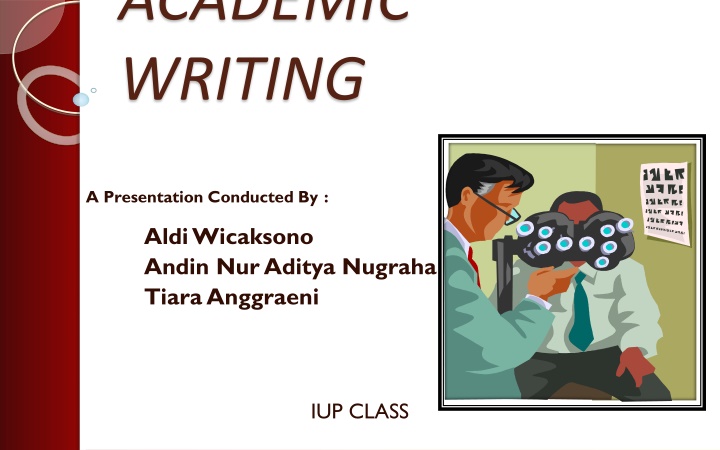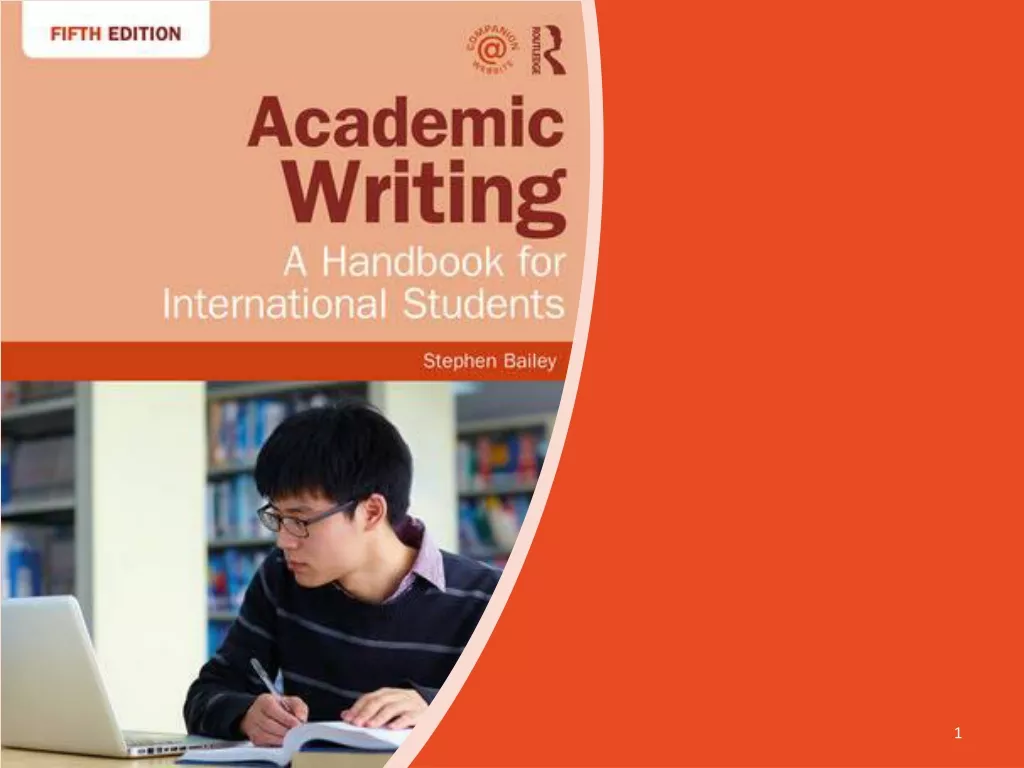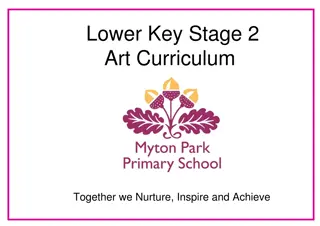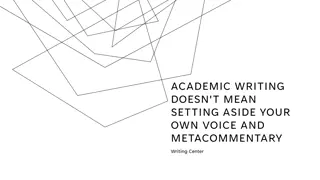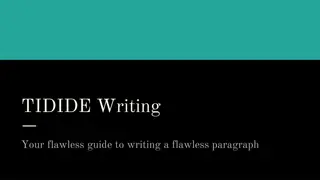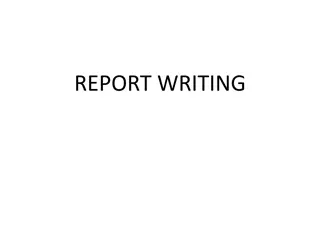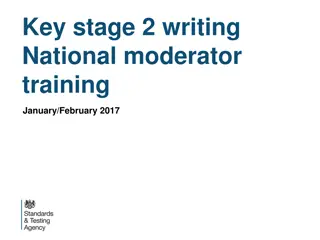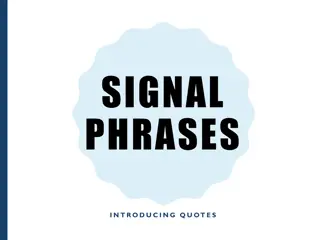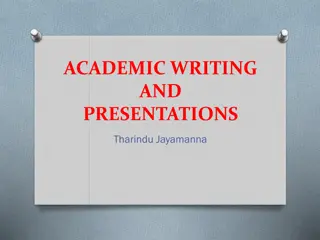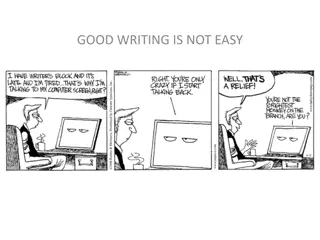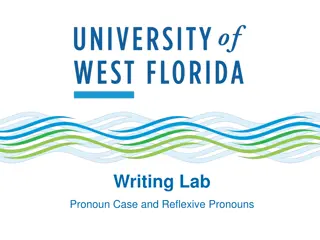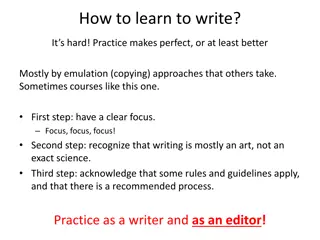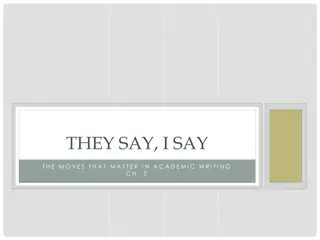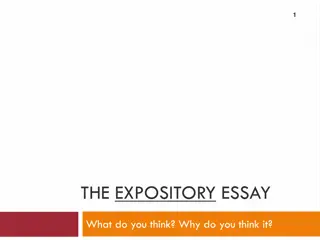Mastering the Art of Academic Writing
Understand the essence of academic writing, focusing on problem-solving, deductive reasoning, and evidence-based arguments. Learn the purpose, methodology, and key tips to enhance your writing quality and presentation in academic settings.
Download Presentation

Please find below an Image/Link to download the presentation.
The content on the website is provided AS IS for your information and personal use only. It may not be sold, licensed, or shared on other websites without obtaining consent from the author.If you encounter any issues during the download, it is possible that the publisher has removed the file from their server.
You are allowed to download the files provided on this website for personal or commercial use, subject to the condition that they are used lawfully. All files are the property of their respective owners.
The content on the website is provided AS IS for your information and personal use only. It may not be sold, licensed, or shared on other websites without obtaining consent from the author.
E N D
Presentation Transcript
ACADEMIC WRITING A Presentation Conducted By : AldiWicaksono Andin NurAditya Nugraha Tiara Anggraeni IUP CLASS
What is ACADEMIC WRITING ?? ACADEMIC WRITING is a process of problem solving and using deductive reasoning, formal voice and third-person- point of view. Its about what you think and what evidence has contributed to that thinking
PURPOSE of Academic Writing Everything that included on academic writing must be based on solid evidence and there are no plagiarism. Academic Writing can allow you to present your argument and analysis more accurately and precisely.
How is it done? There must be some clear goal. And the academic writing that made is not just writing (evidence is important too) If there is any uncertainty about a particular point, use cautious language (such as may , might , could , potentially ). Avoid the use if repetation words Avoid long sentence, focus on mixing the long and short sentence for variation of rhythm
Avoid slang words and phrases Avoid overly elaborate language Avoid abbreviations and contractions Avoid vague terms Avoid conversational terms Avoid impersonal sentence
Avoid The use of Elaborate Words Elaborate ? or subject related, use simple words in place of obscure words that have the same meaning. Using overly elaborate language can make your writing seem PRETENTIOUS When using words that are not technical
Avoid abbreviations and contractions !!! Abbreviations and contractions are informal, and are best avoided in academic writing For best example look at the table below..!! Abbreviation and contraction NORMAL WORDS Dept Isn t Department Is not
COMPARE THESE TWO BOX Avoid slang words and phrases 1. The individual was sentenced for nicking a bike. 2. The doctor looked kind of worried when he reviewed the case notes. 1. The individual was sentenced for stealinga bike 2. The doctor looked slightly worried when he reviewed the case notes.
Technically conversational terms means that if you want to make your writing more emphasis,never use conversation like word (example below) Avoid conversational terms This totally changed people s lives Why is totally there? If it s a filler it can be omitted.
Avoid vague terms In the previous slide we remind you to always use appropriate words and formal don t even use vague terms The right thing would be better expressed as the right action or the right procedure
Avoid the use of impersonal sentence In many academic disciplines, writing in the first person is NOT acceptable as it is believed to be too subjective and personal. Many tutors prefer impersonal language to be used in assignments. Consideration has been given to... The suggestion is made that... It has been observed that...
Use of Technical and specific language Use technical language and words specific to your discipline where appropriate it is wise to avoid convoluted phrases and terms when writing about general information.
BETWEEN REPORT AND ESSAY REPORT 1. Present information 2. Present data and findings that you have collected yourself e.g. in an experiment, survey, case study or particular experience. 3. Are divided into separate sections 4. Their structure means they can be scanned quickly 5. Often include recommendations for action. 6. Are typical of writing produced in the workplace. ESSAY 1. Tend to present an argument 2. Focus on evaluating or analysing theories, past research by other people and ideas. Rarely include new or original research. 3. Are continuous pieces of prose 4. Are meant to be read carefully 5. Do not generally include recommendations 6. Are mostly used in academic settings
THEY HAVE SIMILARITIES (^_^) Both use formal academic style Have some form of introduction, main body and a conclusion Contain critical analysis Are well structured and presented
When we going to make academic reports ?? 1. Often after a project or investigation. 2. Projects/Investigations can be practical 3. Or literature based
What is academic REPORT ??? 1.A report presents the results of an investigation. 2.Reports are highly structured forms of writing.
LITERATURE REVIEW Literature review actually reading and works of other before commencing the academic writing Not needed in a standard report- but required for thesis/dissertation Critical evaluation of literature on topic or issue of study Identify gaps in subject area
REFERENCES AND APPENDICES References (Harvard or Vancouver) Appendices - An appendix contains material which is too detailed to include in the report.
PRESENTATION SUMMARIES 1.Academic writing is formal in style and there are a number of conventions to follow. 2.Once you have completed your first few assignments, you should become more familiar and confident with this style of writing.
Presentation data source academic writing.pptx intro_to_acad_writing.pptx education-portal.com/academy/lesson/what-is- academic-writing-definition-examples-quiz.html
